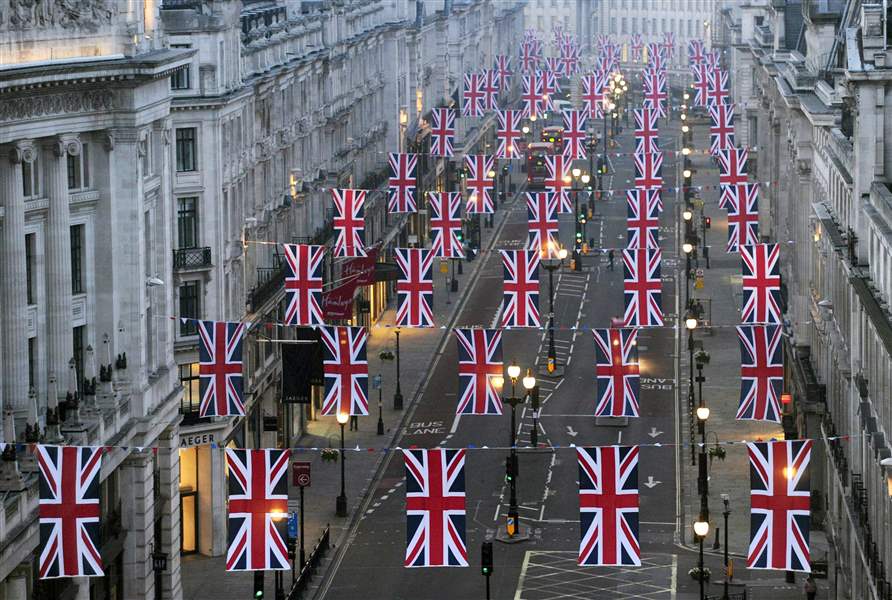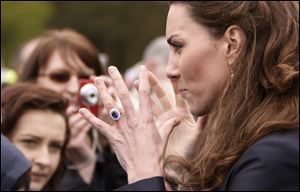
Royal wedding revives idea to give first-born daughter right to throne
4/21/2011
Union Jack flags bedeck Regent Street in London as the city gets ready for next week's royal wedding.
ASSOCIATED PRESS

Kate Middleton talks with well-wishers in the crowd at Witton County Park, Darwen, England, when she and fiance Prince William visited local youth charities.
LONDON -- It's being called "the Downton Abbey conundrum" by the British press.
Should Britain's primogeniture law be changed to give a daughter born to Prince William and Kate Middleton the same right to the throne as a son?
The bias against daughters inheriting family estates was a major plot line in the recent Masterpiece Theatre television drama, but this issue involves the throne of England, and as the royal nuptials draw nearer, the issue has taken on some urgency, at least in political circles.
Prime Minister David Cameron said this week that he supports, in principle, a change to the law. He also would scrap a rule that prohibits a Catholic, or anyone married to one, from ascending the throne. But he warned it could take years to change the law -- long after Prince William and Ms. Middleton start having children.
"In principle, I think both changes should be made," he told BBC radio this week. "But it will take time because it's not just our decision, it's a decision for others as well. We ought to have proper discussion with other countries. … We have to recognize that the queen is not only the queen of the United Kingdom but also of many other jurisdictions."
Those jurisdictions include 15 other countries where Queen Elizabeth II is head of state, including Canada and Australia.
Canada's Prime Minister Stephen Harper has shrugged it off as not a top priority, and in Australia, opponents of a change in succession laws fear that republican politicians -- that's republican as in anti-royalist, pro-republic politicians -- would use the change to remove the queen as head of state in that country.
Lawrence Goldman, a professor of modern history at Oxford University, noted, however, that Australians staged a referendum on whether to become a republic in 1999, which was defeated. Since then, political leaders have continued to voice their support for a republic, but are unlikely to make any movement until Queen Elizabeth II is gone.
"Most people here have no problems at all with this change. It seems perfectly appropriate and altogether in tune with the times," he said.
Britain isn't the only constitutional monarchy that has been wrestling with the issue.
In Japan, there was a public outcry over similar succession laws after Crown Prince Naruhito and Crown Princess Masako had a girl, Aiko, Princess Toshi -- their only child.
The issue was dropped, however, after Crown Prince Naruhito's brother, Prince Akishino, and his wife, Princess Kiko, produced a boy, Hisahito.
Deputy Prime Minister Nick Clegg, a member of Britain's Liberal party, told reporters the issue would "require careful thought" but that he and Mr. Cameron were "sympathetic" to changing the rules, "which seem a little old-fashioned."

Union Jack flags bedeck Regent Street in London as the city gets ready for next week's royal wedding.
"Prince William and Catherine Middleton might have a baby daughter … as their first child, I think most people in this day and age would think it's worth considering whether we change the rules so that that baby girl then could become the future monarch," Mr. Clegg said.
Britons seem to be mildly disagreeing with each other on the issue -- if they disagree at all.
Kathrin Dunn, a 25-year-old accountant, said she has never considered herself a feminist -- "I like equality, but I don't want it weighted too much toward the woman. The whole idea of going around shouting about being equal isn't my style," she said. Still, she admires Queen Elizabeth II, and believes the public would be perfectly accepting of a change. "I think everyone has a pretty modern attitude about these things," she said.
"It makes no difference to me. It seems quite right either way," added Bob Ilze, 62, who was taking an evening stroll in Duke of York Square. "But perhaps in today's world, we need to be a bit more progressive."
While Buckingham Palace has no comment, the royal family is said to support the change.
The law dates back to the 1701 Act of Settlement, which gives male heirs first chance to the throne, but even a cursory look at British history shows it often doesn't work out that way. Queen Elizabeth II, who turns 85 Thursday and will celebrate 60 years as monarch next year, ascended to the throne because she had no brothers. Queen Victoria, took the crown after the deaths of one dissolute uncle after the other, or their legitimate children died.
The Catholic issue is more complex.
In England, the monarch is not just the head of state but the Supreme Governor of the Church of England, which was founded by Henry VIII after he broke with Rome in the 1530s. Indeed, the monarch is called "the defender of the faith," although Prince Charles has spoken about being a "defender of faiths" and is said to support a modernization of the law.
The 1701 law was also intended to prevent the Stuart Catholics from regaining power, and ruled that the king or queen must swear to maintain the Church of England.
Today, some vestiges of anti-Catholicism remain in this country, said Elena Curti, an editor at The Tablet, the country's leading Catholic newspaper.
It's a sense that somehow Catholics are outsiders, even though there are 1 million practicing Catholics in England, more than practicing Anglicans, she said. That sentiment took root during Elizabeth I's reign when the Pope declared the queen a heretic "and in effect told Catholics it was their duty to bring her down. Ever since, the idea has persisted in some quarters that Catholics owe their allegiance to the Pope instead of the monarch and are enemies of the state."
A change in the law would require the disestablishment of the Church of England, she added, "which is a big problem, because you'll have a whole lot of people who aren't quite sure then what church they belong to. Of course the law is discriminatory, but disestablishment is not a good outcome."
Indeed, traditions die hard.
"They shouldn't change the law just for equality's sake," said George Juer, 29, a graduate of Eton, Britain's oldest and grandest public school. Mr. Juer, an events planner, was perched on a bar stool at Bart's, an exclusive private club in Chelsea, on Tuesday evening.
"I'm not anti-queen, but kings went to war. They led this country into battle. And why change something that's worked perfectly well for so long? And my girlfriend agrees with me, by the way.
"But if it ever comes up for a vote, it will pass."
The Block News Alliance consists of The Blade and the Pittsburgh Post-Gazette. Mackenzie Carpenter is a reporter for the Post-Gazette.
Contact Mackenzie Carpenter at: mcarpenter@post-gazette.com, or 412-263-1949.